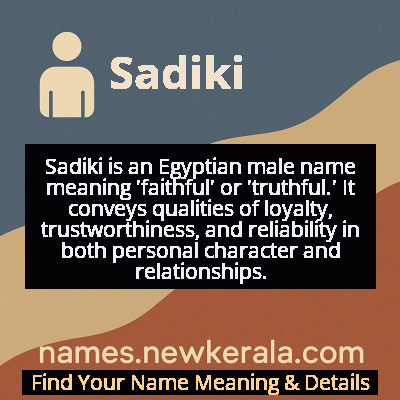Sadiki Name Meaning & Details
Origin, Popularity, Numerology Analysis & Name Meaning of Sadiki
Discover the origin, meaning, and cultural significance of the name SADIKI. Delve into its historical roots and explore the lasting impact it has had on communities and traditions.
Name
Sadiki
Gender
Male
Origin
Egyptian
Lucky Number
8
Meaning of the Name - Sadiki
Sadiki is an Egyptian male name meaning 'faithful' or 'truthful.' It conveys qualities of loyalty, trustworthiness, and reliability in both personal character and relationships.
Sadiki - Complete Numerology Analysis
Your Numerology Number
Based on Pythagorean Numerology System
Ruling Planet
Saturn
Positive Nature
Ambitious, efficient, realistic, and authoritative.
Negative Traits
Materialistic, stressed, confrontational, and can be overly ambitious.
Lucky Colours
Dark blue, black.
Lucky Days
Saturday.
Lucky Stones
Blue sapphire, amethyst.
Harmony Numbers
2, 4, 6.
Best Suited Professions
Business leaders, managers, financial services, law enforcement.
What People Like About You
Leadership, determination, organizational skills.
Famous People Named Sadiki
Sadiki Kaba
Politician
Senegalese Minister of Justice and prominent political figure
Sadiki Fuller
Football Player
Professional American football running back who played in the NFL and CFL
Sadiki Bakari
Musician
Tanzanian musician known for blending traditional African rhythms with modern sounds
Sadiki Maheshe
Journalist
Congolese journalist and human rights activist working in conflict zones
Name Variations & International Equivalents
Click on blue names to explore their detailed meanings. Gray names with will be available soon.
Cultural & Historical Significance
The spread of Islam throughout Egypt and North Africa cemented Sadiki's popularity as parents sought names that reflected both religious devotion and moral character. During the Ottoman era, the name maintained its prominence among educated classes and religious scholars. In modern Egyptian society, Sadiki represents a connection to traditional values while adapting to contemporary life. The name continues to be chosen by families who wish to instill qualities of faithfulness and reliability in their sons, serving as a constant reminder of the importance of keeping one's word and maintaining strong moral principles in all aspects of life.
Extended Personality Analysis
Individuals named Sadiki are typically perceived as deeply trustworthy, reliable, and principled. They tend to be the anchors in their social circles—people who others naturally turn to for honest advice and steadfast support. Their faithfulness extends beyond personal relationships to their professional commitments and moral convictions. Sadikis often exhibit strong leadership qualities not through dominance but through consistent demonstration of integrity and loyalty. They are usually patient, thoughtful decision-makers who weigh their words carefully and follow through on promises.
While sometimes perceived as reserved or serious, this stems from their deep sense of responsibility rather than aloofness. Their strength lies in their unwavering character and the quiet confidence they inspire in others. In professional settings, Sadikis are often the team members who ensure projects are completed thoroughly and ethically. They value deep, meaningful relationships over superficial connections and are known for their long-term loyalty to friends and family. When faced with challenges, they demonstrate remarkable resilience and consistency, making them reliable partners in both personal and professional endeavors. Their name essentially becomes a self-fulfilling prophecy, as they grow into the faithful, trustworthy individuals their name suggests.
Modern Usage & Popularity
In contemporary times, Sadiki maintains steady usage in Egypt and among Egyptian diaspora communities worldwide. While not among the most popular modern names, it enjoys consistent appreciation as a traditional choice that conveys strong moral values. The name has seen some resurgence among parents seeking authentic Arabic names with deep cultural roots, particularly as global interest in meaningful, heritage names grows. In urban Egyptian settings, it's sometimes used as a middle name to honor family traditions while giving children more modern first names. The name remains particularly popular in educated, middle-class families who value its historical significance and the positive qualities it represents. Among the Egyptian diaspora in Europe and North America, Sadiki serves as a cultural anchor, connecting new generations to their heritage while providing a distinctive yet meaningful identity in multicultural societies.
Symbolic & Spiritual Meanings
Symbolically, Sadiki represents the foundation of trust upon which relationships and communities are built. It embodies the concept of covenant-keeping—the sacred bond between individuals, families, and their faith. The name carries the metaphorical weight of a pillar or anchor, suggesting stability and reliability in turbulent times. In broader symbolic terms, Sadiki represents the human capacity for unwavering commitment and moral consistency. It symbolizes the bridge between word and deed, promise and fulfillment, making it a name that carries the weight of honor and the light of truth in both personal character and social responsibility. The name also serves as a symbolic reminder that true strength lies not in power or wealth, but in the consistent demonstration of faithfulness and integrity throughout one's life journey.

